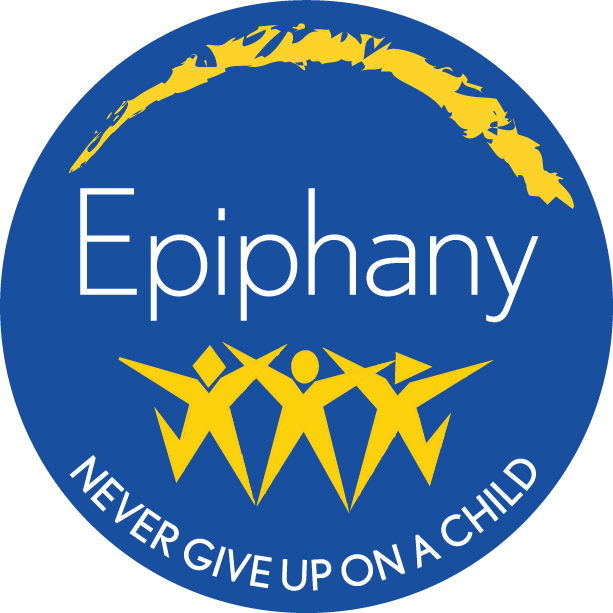A Full-Service, Innovative Learning Community
Epiphany is a "full-service school" that combines an excellent academic program with personal support for each student and family. Through collaborative programming with community agencies, the school helps students and families address their pressing needs. We know an academic program, however strong it may be, is incomplete if a child is unable to take full advantage of it. Full-service programming is central to Epiphany’s mission.
Epiphany develops and sustains a full-service, innovating learning community in several distinct ways:
Health Care
Epiphany delivers ongoing and vitally-needed health care, prevention, and social services. For example 100% of students have access to regular vision, dental, and hearing screenings here at the school. Our student support team collaborates with a large number of established community agencies to provide students and families with the physical and mental health care they need. Many students take part in group or individual therapy, get updated prescriptions and new glasses, and have access to a range of support for many medical and educational challenges. The student support team also partners closely with families who may need assistance navigating government bureaucracies, advocating for additional care and treatment, or finding safe and affordable housing in the region.
Extended School Day
Epiphany’s extended school day and year provide the time and opportunity for students to make important academic and social-emotional gains. It also creates time and space for new and enriching experiences that a typical school schedule wouldn’t allow. School doors open every morning at 6:15 a.m. and don’t close until 6:15 p.m. The school serves students three meals and two snacks each day, with a nutrition program emphasizing fresh, local, and environmentally sustainable food and food-growing. The extended day allows for athletics, homework completion and tutoring support, and more creative possibilities such as yoga, math enrichment, gardening, and creative writing clubs. The Epiphany Summer Intensive at Groton School extends the year by providing all students with a meaningful summer experience, alongside additional interest-based trips such as a week farming on a Vermont farm or exploring marine biology on an island in Maine.
Academic Flexibility
Epiphany sustains a dignifying, demanding, and flexible academic curriculum that seeks to give the best possible education to the wide range of learners in our community. We have a small school community and small classes by design, allowing for effective individualization and differentiation of learning and avoiding the often degrading effects that ability tracking can have on student culture and psyche. Students with a wide range of cognitive profiles and academic backgrounds learn together in classrooms where their assets are valued and their language, cultures, and experiences are dignified. Epiphany’s faculty structure, with lead teachers guiding curriculum design and teaching fellows supporting and assisting in classrooms, creates a mutually beneficial relationship in which students can have multiple adults academically supporting them and young professionals interested in education can be apprenticed into future teaching, counseling, and youth development careers.
safe environment
Epiphany fosters a safe, trauma-sensitive school environment. At the heart of our mission is a real and rather unique security: the commitment to “never give up on a child.” The small school community allows students to develop an intellectual safety and to take academic risks and explorations that they otherwise might not, knowing that they are well-known to and closely cared about by faculty who collaborate on students’ specific needs and goals for academic growth. Epiphany’s student support team leads the faculty and staff through ongoing training and reflection around how we can create a school environment that is trauma-informed and knowledgeable about how students’ previous or current traumatic experiences outside of the classroom might be affecting what they bring to the classroom as learners.
Spirituality
Epiphany is a spiritually-attentive and self-reflective place. Founded in the Episcopal tradition, Epiphany is led and sustained by individuals of many faiths and of no faith at all. At our center is a commitment to the dignity and value of every human being, a commitment which grounds our full-service model and our mission to “never give up on a child.” This creates a welcoming space for adolescents and adults to explore their biggest questions and most deeply held values together, often through religious studies classes that engage students in study of themselves and their identities, of world religious traditions, and of social justice activism and community service work here and around the world. As a place attentive to spiritual exploration and reflection, Epiphany seeks to be institutionally reflective and in constant pursuit of a more just and dignifying school structure and culture. We recognize the reality of both the tangible and the intangible, the seen and unseen consequences of actions and decisions, and the finite ways we expect to see student progress alongside the infinite possibilities for student expression and growth that we can’t yet foresee.
Click here to read more.
collaboration
Epiphany’s small and collaborative structure allows us to be agile and always learning. Nothing is more important for an educational institution than the ability to practice the intellectual values that it teaches - to question existing assumptions, value every member’s voice, and grow into an ever wiser and more humanizing place. Epiphany as an institution seeks to welcome dissenting voices, hard questions about the way we do things, and new ideas for better serving students. Robust debates about competing pedagogical styles and school policies help create a larger community of learners at Epiphany that includes both students and teachers, all practicing intellectual and character virtues toward the goal of becoming better citizens and better people. As students, as teachers, and as a school, we are always learning.







